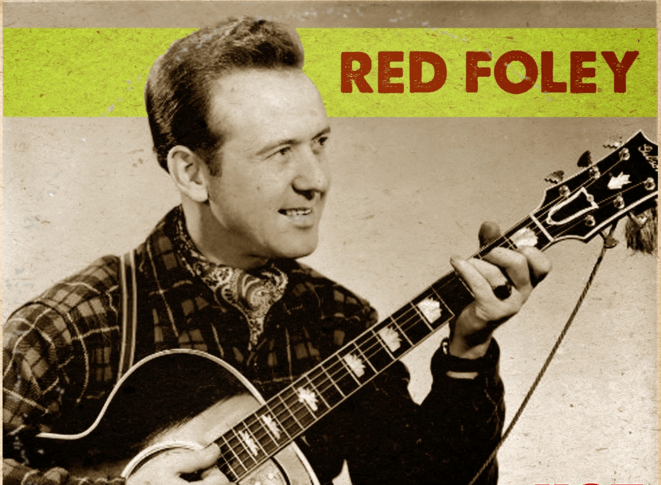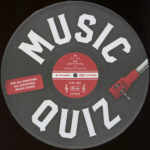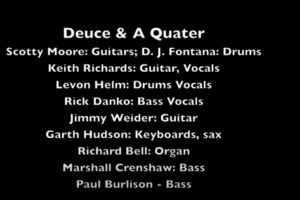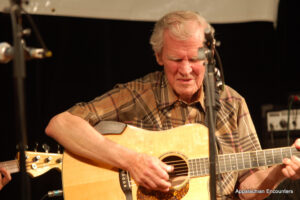I scan several “This Day in Music”-type sites — rock, country, jazz, even classical — when stumped for a blog topic. Today, a country version said that on February 14, 1950, Red Foley released “Chattanoogie Shoe Shine Boy,” a western swing-tinged country number that was the first country song to earn a spot on Billboard’s pop music charts. In fact, according to the notes at the YouTube posting, it spent 15 weeks on the chart and reached number one.
 This three-disc greatest hits CD has 62 songs recorded from 1944 to 1959, including”Chattanoogie Shoe Shine Boy.” Michelle Lavallee at AXS writes that Foley’s 10 great hits were “Tennessee Saturday Night,” “Beyond the Sunset,” “Sugarfoot Rag,” “New Jolie Blonde (New Pretty Blonde),” “Old Shep,” “One By One,” “Smoke on the Water,”– no, not that one — “Hot Rod Race,” “Chattanoogie Shoe Shine Boy” and “Peace in the Valley.” The last one listed was a cover of a song written for Mahalia Jackson. Click on the image for the album or Click here (iTunes) for “The Country Music Hall of Fame: Red Foley.”
This three-disc greatest hits CD has 62 songs recorded from 1944 to 1959, including”Chattanoogie Shoe Shine Boy.” Michelle Lavallee at AXS writes that Foley’s 10 great hits were “Tennessee Saturday Night,” “Beyond the Sunset,” “Sugarfoot Rag,” “New Jolie Blonde (New Pretty Blonde),” “Old Shep,” “One By One,” “Smoke on the Water,”– no, not that one — “Hot Rod Race,” “Chattanoogie Shoe Shine Boy” and “Peace in the Valley.” The last one listed was a cover of a song written for Mahalia Jackson. Click on the image for the album or Click here (iTunes) for “The Country Music Hall of Fame: Red Foley.” There is a problem, however. Both songs have latent strains of racism. They are subtle. It’s unfair to blame the artists (or the song writers), who were writing and singing at that particular moment in history. At the same time, this must be discussed. While there is no overt racism in the songs—the “N-word” is not used, for instance — the racism is evident in the opening two lines of “Chattanooga Choo Choo”:
Pardon me boy, is that the Chattanooga Choo Choo?
Track twenty nine, boy you can give me a shine
It has always struck me is that this little nugget of racism is an unquestioned part of a cherished American song. It is so familiar to so many people that it doesn’t raise an eyebrow.
The Red Foley song starts this way:
Have you ever passed the corner of Fourth and Grand?
Where a little ball o’ rhythm has a shoe-shine stand
People gather ’round and they clap their hands
He’s a great big bundle o’ joy
He pops the boogie woogie rag
The Chattanoogie shoe-shine boy

It goes on like that. The point is that racism – subtle and overt, paternalistic and vicious – are part of our past and present and can’t be ignored. At the same time, the art can’t be quarantined either. It certainly is not a new point. “Huckleberry Finn” and other classics use the “N-Word.” Educators struggle with how to present the novel. One of the more popular posts on this site features The Memphis Jug Band, which was comprised of African-Americans. One of the songs uses the “N-word” twice. It simply is part of who we are.
The way of condescending to African Americans in that age – especially young ones and especially in the south – was insidious and so ingrained and natural that it didn’t even need to be overtly mentioned. It was baked in. We need to constantly remind ourselves of our past.
Clyde Julian (Red) Foley lived from 1910 to 1968. Wikipedia says that he was a major contributor to the growth of country music after World War II. He sold more than 25 million records. His 1951 song, “Peace in the Valley” was one of the first gospel songs to sell a million records. From 1955 to 1960, Foley hosted “Ozark Jubilee,” the profile says was the first country music television program to become popular.
Wikipedia runs through Foley’s career, which kicked off in about 1930. It includes an interesting and poignant description of the night that he died. Hank Williams Jr. was there and wrote a song about the event. Foley was an influence on Jerry Lee Lewis and Elvis Presley, who both covered several of his songs. Perhaps most famously, Presley had a hit with the Foley song “Old Shep,” which was about his dog. That song also was covered by Hank Snow. Foley has two stars on the Hollywood Walk of Fame: One is for his singing and the other for his career in television.
Alan Cackett offers deeper background on Foley. It’s not all a pretty picture. He writes that Foley’s image as a God-fearing man was a bit of a façade. His second wife committed suicide in 1951 after finding out that Foley was having an affair with a woman who later became wife number three. He was a heavy drinker and sunk into a depression as his popularity waned in the 1960s.
“Chattanoogie Shoe Shine Boy” is above and “Birmingham Bounce” is below. The guitar player in both is Grady Martin, who also is in the Country Music Hall of Fame. By chance, his image is captured on the YouTube below. The video from the latter is from the Ozark Jubilee and was recorded on September 17, 1955.











Recent Comments